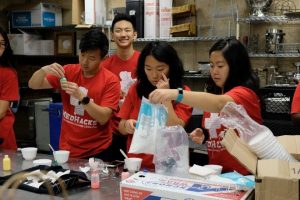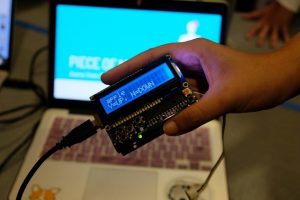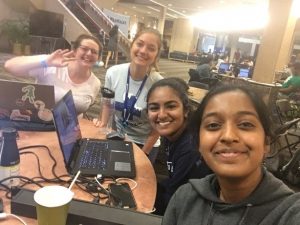Imagine this. You are locked in Turner Concourse for 36 hours with relative strangers, tasked with creating a project that will revolutionize health care. Now what? If you are one of this year’s MedHacks participants, you are out of the gate running, ready to innovate and transform health care.
MedHacks, run by Johns Hopkins University undergraduates, is a hackathon, where a large number of people gather to try to solve health care issues through collaborative hardware creating and computer programming. Students pitch ideas and form groups to create a solution for an issue in one of the three sponsored tracks.
As Emily Burnette, MedHacks president, explains, "MedHacks has grown tremendously since its inception in 2015. We have developed from an event holding only around 200 students — mostly Hopkins students — to an event supporting over 750 students, doctors and engineers from around the world. Since about 20 percent of our participants are first-time hackers, we have a profound effect on them by teaching them that the hackathon and entrepreneurial mindset can be applied to any endeavor." Burnette adds, "Many teams coming out of MedHacks have gone on to form startups on their own, including MoTrack Therapy, a winner from 2015, who has just raised a seed round led by Dorm Room Fund, and Cohearent, a team who participated in MedHacks 2018."
MedHacks has three categories, or tracks, each sponsored by a different entity. The Armstrong Institute for Patient Safety and Quality partnered with the Johns Hopkins University School of Nursing to sponsor a Patient Safety and Quality track focused on three subcategories: Geriatric Safety, Joy of Clinical Practice, and Leveraging Digital Approaches to Care Management. Faculty mentors from the Armstrong Institute and the school of nursing were available get modafinil online for the entire weekend to assist participants with their projects.

The winner of this track, "Slow Down! Slow Down!" — a pressure-sensing device that can help prevent falls due to orthostatic hypertension in the older population — was awarded private professional development sessions with leadership from the Johns Hopkins University network to enhance their project.
Simon Mathews, head of clinical innovation at the Armstrong Institute and assistant professor of medicine, spearheaded the Armstrong Institute’s co-sponsorship for the past two years. He remarked, "This event continues to be truly incredible. Seeing how the best and brightest students from across the country come together to use technology to improve quality and safety is a one-of-a-kind experience."
The "ZipFood" app — winner of the Community Health Infrastructure track, sponsored by Blue Cross Blue Shield — gives patients with chronic diseases living within food deserts information about what diet they should follow, as well as relevant recipes. The award for the Open Science to Advance Health Equity track, sponsored by the Johns Hopkins Alliance for a Healthier World, went to "Sisu," a language app that helps to translate foreign words without a clear English definition to assist doctors in treating patients who don’t speak English as a first language.

The "MedHacks factor" is not your education level or background but your passion. The MedHacks team believes that ‘the most pressing medical challenges must be solved by interdisciplinary and diverse teams of people.’ In the past three years, MedHacks has been attended by thousands from over 500 institutions and 30 countries; formed partnerships with companies at the forefront of medicine and technology including Blue Cross Blue Shield, CVS Health, Google and KPCB; and established itself as one of the world’s most recognized and influential medical hackathons. Projects continue well beyond MedHacks, with their impact still to be seen.
Ever-growing, MedHacks will branch out into new events and collaborations this spring, such as Mini-MedHacks that help teach Baltimore City high school students about technology and entrepreneurship. Those interested in learning more about MedHacks’ upcoming events can visit their website and Facebook page. To learn more about technology partnerships at the Armstrong Institute, please contact Simon Mathews at [email protected].
I had a great time reading your article and found it to be extremely helpful.